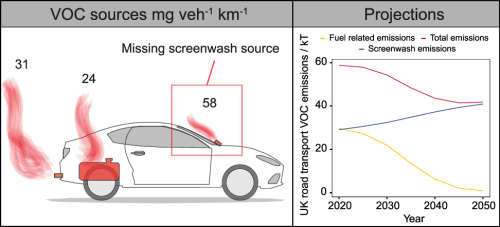
In a recent open-access paper published in ACS’ Environmental Science & Technology, researchers from the University of York report that alcohols in windshield washer fluid account for a larger fraction of real-world vehicle emissions than previous estimates have suggested. The levels of these non-fuel-derived gases will likely remain unchanged, even as more drivers transition from gas-powered to electric vehicles.
There are widespread policy assumptions that the phase-out of gasoline and diesel internal combustion engines will over time lead to much reduced emissions of Volatile Organic Compounds (VOCs) from road transport and related fuels. However, the use of real-world emissions measurements from a new mobile air quality monitoring station demonstrated a large underestimation of alcohol-based species in road transport emissions inventories.
Scaling of industry sales statistics enabled the discrepancy to be attributed to the use of ancillary solvent products such as screenwash and deicer which are not included in internationally applied vehicle emission methodologies.
A fleet average nonfuel nonexhaust VOC emission factor of 58 ± 39 mg veh–1 km–1 was calculated for the missing source, which is greater than the total of all VOCs emitted from vehicle exhausts and their associated evaporative fuel losses. These emissions are independent of the vehicle energy/propulsion system and therefore applicable to all road vehicle types including those with battery-electric powertrains.
In contrast to predictions, vehicle VOC emissions may actually increase given a predicted growth in total vehicle kilometers driven in a future electrified fleet and will undergo a complete VOC respeciation due to the source change.
—Cliff et al.
Cars’ average carbon dioxide emissions have dropped by 25% since the early 2000s, according to the US Environmental Protection Agency (EPA), but this gas only accounts for part of the total. Another important component of emissions is volatile organic compounds (VOCs), a broad classification of carbon-based molecules that are easily vaporized and that can contribute to ozone formation.
While some VOCs are released in exhaust, others may arise from an unexpected source—e.g., the products used for “car care,” such as windshield washer fluid.
Estimates from a national inventory of manufacturer statistics in the UK showed that car-care products could be an even greater source of VOCs than exhaust, but these numbers had never been verified experimentally. Samuel Cliff and colleagues at York decided to measure the amounts of vaporized windshield washer fluid ingredients from cars on a real-world road and compare it to the inventory estimates.
To measure the VOCs actually emitted by vehicles, the researchers outfitted a van with several instruments, including a mass spectrometer, and parked it near a busy roadway. By comparing the van’s measurements with those from a university site with minimal traffic influence, they calculated the average amount of vapor given off per car for each kilometer traveled for several key VOCs.
The measured values matched inventory estimates for aromatic compounds that are commonly monitored and regulated, but those for alcohols—key ingredients in windshield washer fluid—far exceeded inventory numbers.
The release of two alcohols—ethanol and methanol—was nearly twice the amount of all VOCs released in exhaust. The discrepancy in alcohol emissions could be accounted for by including solvents from car-care products in the inventory estimations, suggesting that these products are a significant, if unexpected, source of vehicle-derived pollutants.
The researchers say that this finding has implications for future regulatory policy especially as drivers transition to electric vehicles, which may have fewer emissions from fuels but will still need clean windshields.







